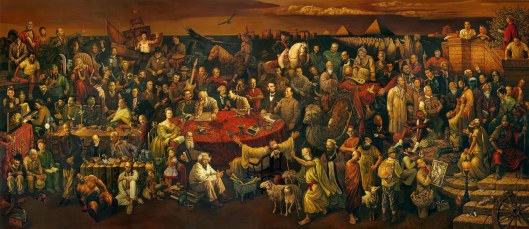Making the World Spicy…Literally
“He who controls the spice, controls the universe!”
– Frank Herbert, Dune
Some of the greatest moments of ingenuity and progress in history have been sparked by the simplest of our human needs: food. This progression begins at the very first era of our human history: the moment Homo sapiens learned to grow their own food rather than futilely chase hulking animals across the globe for meat and bone. This led to a large-scale shift from small hunter-gatherer family groups to villages, towns, cities, and quickly entire civilizations – all because they had good sources of food and water. This is also why many settlements, towns, and cities are near riverbeds or perched on the foaming edges of the earth: an easy source of water to bring one another to life.
Great explorers set out searching to scan the sea for treasures of gold and diamonds, but even more precious was their quest for spice and salt. These days we mainly use these as accessories to liven up our meals, but for civilizations of the past they represented the preservation of their most vital asset (food, of course). Salt and black pepper played crucial roles in diets throughout the middle ages, preserving good taste in spoiled meat. It was so precious pepper was actually a commodity in and of itself: it is said that Attila the Hun demanded the ransom of more than a ton of pepper after besieging a city in the 5th century, a far cry from today when a pound of pepper can be bought at any grocery store in America. The spice trade opened lines of culture-sharing across multiple continents for centuries, from Western Europe all the way to Indonesia, making most parties involved fantastically rich and providing the defining factor for an age of discovery. Though Frank Herbert’s famous novel Dune spoke of “spice” as a drug, he still alluded to the very real impact of spice on world food economies (see quote, above).
When the New World was discovered, the world underwent yet another massive upheaval affecting the lives and the taste buds of people everywhere. In addition to delicious new tastes like chocolate and vanilla, the combined tastes of coffee from Africa and the carbohydrate-laden potato from South America led the charge in energizing a continent to begin the Industrial Revolution starting in the 17th century. Never before had Western people had the pure energy and electricity flowing through their veins, leading them to work longer hours and continue working with energy for new ideas, new adventures, and new inventions. Technology returned the favor, granting them kerosene lamps and incandescent lightbulbs to continue work into the night. This new energy changed the world forever.
Even today, much of our world revolves around food. The school year is organized the way it is because when public schools started, children were needed to help out on the farm and provide the harvest for their families. Mealtimes serve as very viable springboards for business meetings, dates, connections, interviews, and parties. Food from all corners of the world finds its way to entrench itself in our worldwide fabric, learning to adapt and survive past any cultural boundaries. People say that music or mathematics is the universal language, but food is the universal gift, bought or cooked for those we care for.
OurPangea provides a platform for food lovers to unite and collaborate to share recipes, meals, and cooking tips. It provides a platform for restaurants to connect to their communities and for communities to discover new restaurants. It brings people together to share in a communal environment, designed to create laughter and familiarity. The OurPangea community invites the entire world to sit down at our dinner table and share those connections, bringing in not only food but all culture and every idea to be shared among our family.
Maybe we can even eat it.







